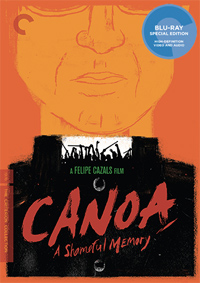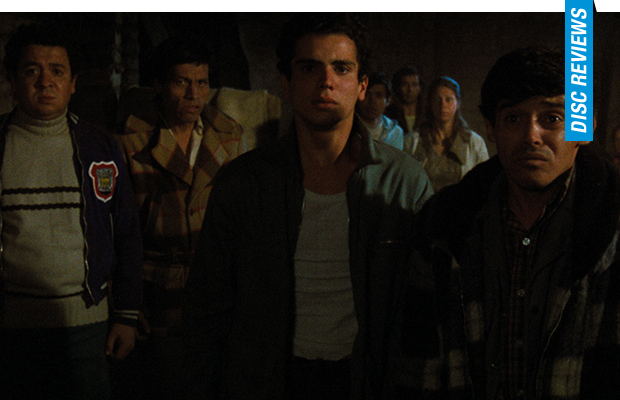Disc Reviews
Criterion Collection: Canoa: a Shameful Memory | Blu-ray Review
 Described as “one of Mexico’s most highly regarded works of political cinema,” Criterion resurrects the highly charged 1976 documentary, Canoa: A Shameful Memory, from director Felipe Cazals. Much like Criterion’s recent restoration of 1963’s The Executioner from Spanish filmmaker Luis Garcia Berlanga, this is yet another fantastic introduction to another Spanish language filmmaker whose politically subversive works haven’t been popularized in the States. Cazals is considered, alongside Arturo Ripstein, as one of the most important Mexican filmmakers of his generation. One of his most notable achievements, this hybrid-styled documentary reenacts a real-life tragedy wherein several university employees were viciously attacked, leading to death and dismemberment at the hands of rural villagers besotted by political and religious furor at the behest of the local priest, imploding with shocking, grindhouse style violence. Despite its exploitation elements, this progressive indictment on religious mania and its indoctrination of fear and ignorance upon isolated populations remains shocking and potent. Awarded the Silver Bear at the 1976 Berlin International Film Festival, the restoration was also a part of the 2017 Berlinale in its Classic program.
Described as “one of Mexico’s most highly regarded works of political cinema,” Criterion resurrects the highly charged 1976 documentary, Canoa: A Shameful Memory, from director Felipe Cazals. Much like Criterion’s recent restoration of 1963’s The Executioner from Spanish filmmaker Luis Garcia Berlanga, this is yet another fantastic introduction to another Spanish language filmmaker whose politically subversive works haven’t been popularized in the States. Cazals is considered, alongside Arturo Ripstein, as one of the most important Mexican filmmakers of his generation. One of his most notable achievements, this hybrid-styled documentary reenacts a real-life tragedy wherein several university employees were viciously attacked, leading to death and dismemberment at the hands of rural villagers besotted by political and religious furor at the behest of the local priest, imploding with shocking, grindhouse style violence. Despite its exploitation elements, this progressive indictment on religious mania and its indoctrination of fear and ignorance upon isolated populations remains shocking and potent. Awarded the Silver Bear at the 1976 Berlin International Film Festival, the restoration was also a part of the 2017 Berlinale in its Classic program.
On September 14, 1968, five employees (Roberto Sosa, Arturo Alegro, Carlos Chavez, Jaime Garcia, and Gerardo Vigil) from the University of Puebla take a road trip for the weekend to San Miguel Canoa, a small town located several kilometers from their city. Once there, they had planned on climbing the local volcano, La Malinche, which was something of a local hiking tradition. However, significant political unrest and unease finds the young met with hostility and disdain once they reach Canoa. A rainstorm necessitates their need for shelter, but since the local priest (Enrique Lucero) denies them accommodations, the obedient locals follow suit, and begin to gather forces in allegiance against the young men, believing them to be Communists who intend to break into the church and hang their flag atop it. Vehemently opposed against the mere mention of Communist infiltration, the townsfolk descend upon the young men, who at last had found shelter with the local villager Lucas Garcia (Ernesto Gomez Cruz).
Structured as a faux documentary, Cazals leads us through the brief history and geographical logistics of Canoa with the help of a sombrero wearing narrator, played by Salvador Sanchez. A witness to the unfolding tragedy, he informs us with increasingly foreboding menace of the elements which caused the events of September 14, 1968 in Canoa, and are linked inextricably to the more famous Tlatelolco massacre which transpired only two weeks later. “Some bad shit is going to happen in this town,” he concludes after leading us through the poverty which has stymied the education system and availability of local resources—the lack of water and an irrigation system requires the locals to drink a pulpy substance, pulque.
With many of the men traveling to the nearby town of Puebla for work, our narrator, like the friendly host from many a Western film, invites us to come and see the vulnerability which led to the insidious manipulations of the local priest (a menacing Enrique Lucero, always in dark glasses). Describing the vicious way in which villagers steal firewood, Cazals lays the groundwork to reveal desperate lives unchecked by manmade rule. Only the fear of the priest’s Catholic teachings, who preaches of a God dead set against the growing legion of Communism, seems to sway them in any regard.
The five victims are introduced as oblivious and happy-go-lucky young men. They’re aware of the locals’ hostility (writing them off as paranoid) as they beg a number of locals for shelter until they’re distracted by some young women and eventually finding solace with the affable Luca, whose dislike of the local priest and his gossipy zeal in sharing his suspicions only helps to distract the young men from the alarms sounding on the village loudspeaker just outside. And at about ninety minutes in, Canoa unleashes its hellish fury as the young men are beaten and careened through the sludge and mud of one particularly dark and dangerous night. If Cazals’ methods at first appear ungainly or perhaps too painstaking, the full force of his reenactment is made clear in the film’s final strenuous moments.
Disc Review:
Criterion grants Canoa: A Shameful Memory a new, restored 4K digital transfer (supervised by Felipe Cazals), presented in its original aspect ratio of 1.85:1 from the 35mm original camera negative. Featuring an uncompressed monaural soundtrack, picture and sound quality have been exceptionally restored. Guillermo Del Toro is on hand for a new introduction, as is Alfonso Cuaron in a new conversation between himself and Cazals.
Guillermo Del Toro Introduction:
Director Guillermo Del Toro introduces Canoa in this three minute bit, discussing the film’s technical prowess and political importance.
Felipe Cazals and Alfonso Cuaron:
Alfonso Cuaron sat down with Felipe Cazals for this near hour long conversation which took place in March 2016 at the Guadalajara International Film Festival for the film’s fortieth anniversary celebration. Cuaron discusses the film’s influence on him after seeing it at a young age, and the auteurs converse on the film’s relevance today.
Final Thoughts:
Considering the rise of populism and continual presence of trenchant religious indoctrination, Canoa: A Shameful Memory is a horrific reenactment worthy of reexamination in our increasingly troubled political climate. While the specific threat of Communism (Cazals’ film makes for a great double feature with Raoul Peck’s The Young Karl Marx) may no longer be the topic at hand, it would appear mob rule tendencies amongst the manipulated, ignorant masses still dictate the same tenets of savagery when left unchecked, making this film as compelling now as it was in 1976.
Film Review: ★★★★/☆☆☆☆☆
Disc Review: ★★★★/☆☆☆☆☆
Film Review: ★★★★/☆☆☆☆☆
Disc Review: ★★★★/☆☆☆☆☆

































